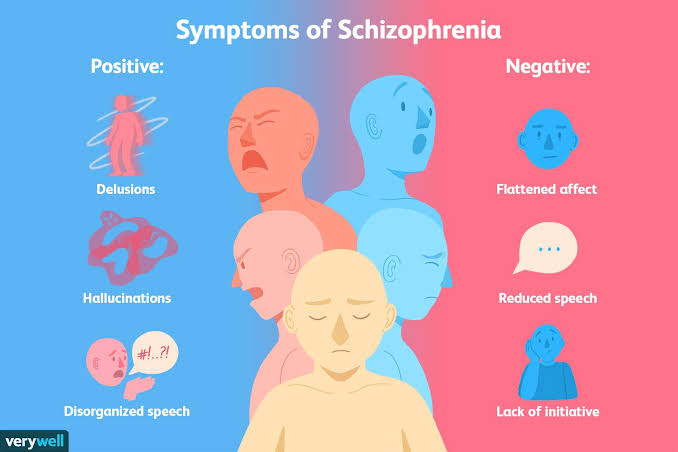
It is a split personality and is mistakenly called schizophrenia. It is a neurological brain disease that leads to a psychological disorder like other mental illnesses, but it differs from them in that it is socially viewed as a frightening disease. It is a division in the patient’s own thought, between the contents of his thought, his actions, and his desires.
Symptoms of schizophrenia:
Abnormal fantasies, unhealthy and irregular thinking, hallucinations, delusions, agitation, lethargy, lack of speech, loss of pleasure in anything, depletion of ideas, unwillingness to mix with society.
The schizophrenic also hears voices talking to each other in his head, and these voices direct him to perform certain actions. He may believe that the ideas circulating in his head are directed to him by others. He may imagine himself as an important and well-known person or believe that others are watching and spying on him. He likes to withdraw into himself and remain silent because he believes that others do not believe him. His brain shows him unrealistic things and he acts according to their data. The fantasies that the patient imagines are often related to his personality and culture. A person who is deeply immersed in literature may think that he is talking to Shakespeare. Also, the person who was logical (before he contracted the disease) becomes empty and illogical, becomes emotionally cold, and cannot express his thoughts easily. He may react out of place, such as laughing when he hears sad or heartbreaking news.
There are many causes of schizophrenia, including:
1. A disorder in the function of the brain control center, which receives information from the outside, classifies it, and then sends it to the sections of the brain that direct thoughts, emotions, and actions.
2. Genetics: If one of the parents or relatives has this disease, then he or she is predisposed to contracting the disease.
3. Biochemical factors: that phospholipids and prostaglandin hormones play a role in causing this disease.
4. Physiological factors: such as the changes that accompany sexual puberty, maturity, pregnancy, childbirth, and retirement age, and the intense emotions that accompany them and the individual’s failure to confront them.
5. Dysfunction in the nervous system as a result of diseases, pathological neurological changes, wounds in accidents, abnormalities in electrical brain waves, weakness and exhaustion of the nerves.
6. Loss of senses, which in turn leads to disordered thinking, delusions, and hallucinations.
7. Psychological conflict from childhood that becomes active again in adolescence as a result of underlying causes.
8. Environmental frustrations, life problems, economic factors and pressures, failure in marriage, traumatic sexual experiences, and the accompanying feelings of frustration and feelings of guilt, as well as sudden failure in exams and failure at work.
9. Troubled family relationships, family climate disorder, and family problems.
This disease may appear at any age, and it affects both sexes, and it can affect children as well as adults. A child sick with schizophrenia is characterized by random speech, deviant thoughts, and aggressive behavior, abnormal perception, loss of friendship relationships and lack of familiarity with others, unrealistic perceptions and imaginary ideas, lack of Attention and concentration, and making abnormal movements and actions.
Schizophrenia treatment:
Schizophrenia requires medical treatment, psychological treatment, and social treatment.
Medical treatment can be carried out externally, except in some severe and advanced cases, in which case the patient remains inside the hospital. The treatment period is long and requires a lot of patience and skill. Doctors often resort to electroshock therapy, which stops hallucinations and intellectual deception. Most of the drugs used in treatment produce frigidity.
Psychological treatment aims to eliminate the causes of the disease, relieve the patient’s anxiety, and restore his self-confidence, while paying attention to the members of his surrounding family and guiding them to ways and methods to help him.
.






